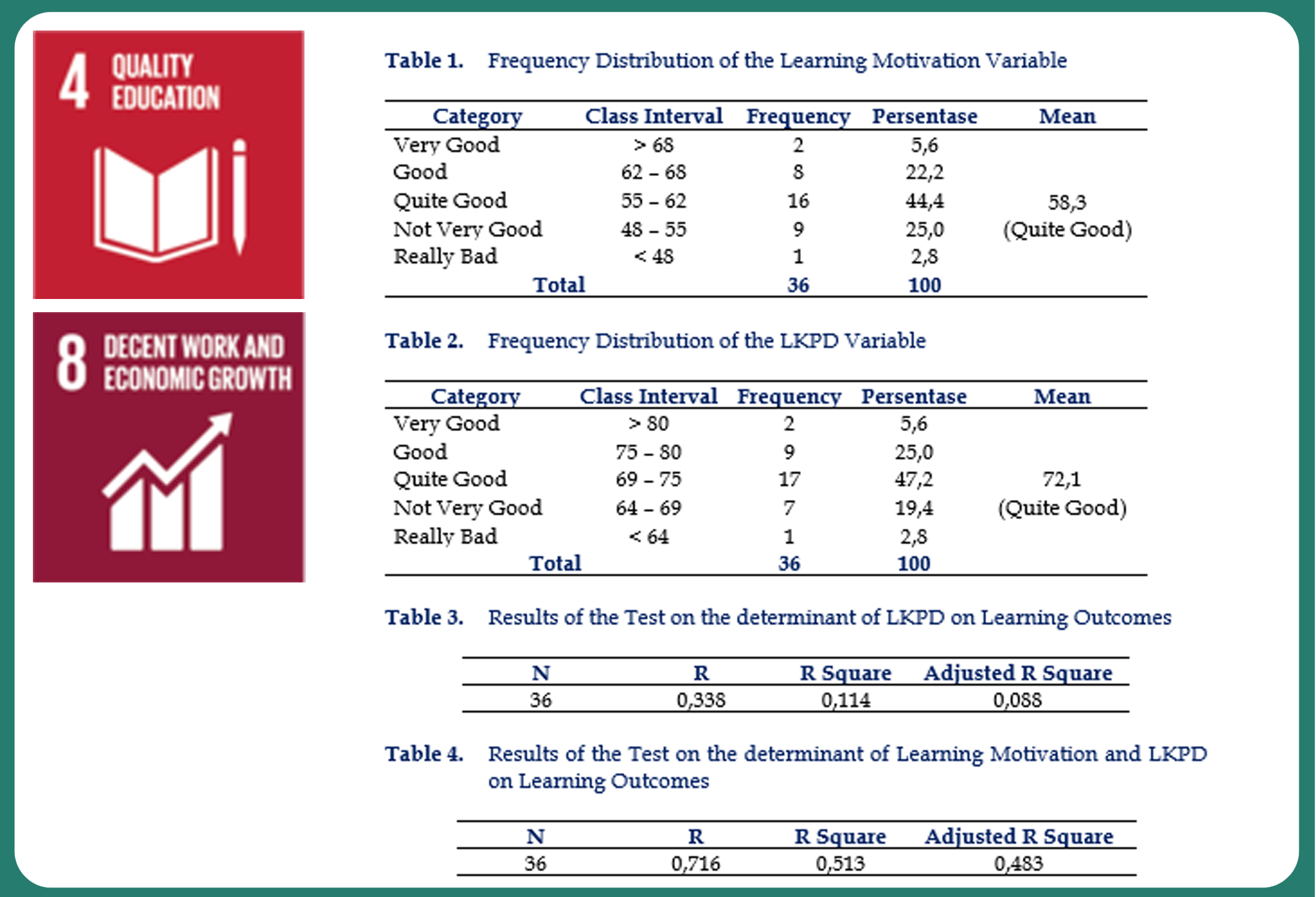The Relationship between Learning Motivation, Student Worksheets, and Learning Outcomes in Computer and Network Engineering Education
DOI:
https://doi.org/10.24036/javit.v5i2.253Keywords:
Learning Motivation, Student Worksheets, Academic Achievement, Vocational Education, Correlational AnalysisAbstract
This study investigates the influence of learning motivation and student worksheets (LKPD) on students’ academic achievement in the subject of Computer and Network Engineering at a vocational high school. The research was motivated by the observation that student learning outcomes remained in the moderate category, potentially due to insufficient motivation and suboptimal use of instructional materials. This study aimed to (1) examine the relationship between learning motivation and learning outcomes, (2) analyze the relationship between LKPD and learning outcomes, and (3) assess the combined effect of learning motivation and LKPD on student achievement. A quantitative approach with a descriptive correlational design was employed, involving 36 Grade XI students in the Computer and Network Engineering program. Data were collected through validated questionnaires and documented mid-semester exam scores. The findings revealed a strong and statistically significant correlation between learning motivation and learning outcomes (r = 0.713, R² = 0.509), a moderate but significant relationship between LKPD and learning outcomes (r = 0.338, R² = 0.114), and a strong combined relationship between learning motivation and LKPD with learning outcomes (r = 0.716, R² = 0.513). These results highlight the critical role of both psychological and instructional factors in shaping academic performance in vocational education.
Downloads
References
N. M. Tri, P. D. Hoang, and N. T. Dung, “Impact of the industrial revolution 4.0 on higher education in Vietnam: challenges and opportunities,” Linguist. Cult. Rev., vol. 5, no. S3, pp. 1–15, Jul. 2021, https://doi.org/10.21744/lingcure.v5ns3.1350.
N. Gupta, P. Vrat, and R. Ojha, “Key drivers that impact the quality of education – a holistic approach,” J. Adv. Manag. Res., vol. 19, no. 3, pp. 488–510, Jun. 2022, https://doi.org/10.1108/JAMR-08-2021-0287.
N. M. (Nguyen) Tri and L. N. (Le) Minh, “Factors Affecting the Role of Education and Training in Human Resource Development of Vietnam,” Int. J. Health Sci. (Qassim)., vol. 6, no. S1, pp. 1–14, Mar. 2022, https://doi.org/10.53730/IJHS.V6NS1.4742.
S. R. Ahmad et al., “Enhancing Employability and Empowerment: Unveiling Factors within PERDA-TECH for Sustainable Development,” J. Tech. Educ. Train., vol. 15, no. 3, pp. 235–244, Sep. 2023, https://doi.org/10.30880/jtet.2023.15.03.021.
S. R. Siti, M. S. Rasul, R. Mohammad Yasin, and H. U. Hashim, “Identifying and Validating Vocational Skills Domains and Indicators in Classroom Assessment Practices in TVET,” Sustain. 2023, Vol. 15, Page 5195, vol. 15, no. 6, p. 5195, Mar. 2023, https://doi.org/10.3390/SU15065195.
A. Rausch et al., “Designing an International Large-Scale Assessment of Professional Competencies and Employability Skills: Emerging Avenues and Challenges of OECD’s PISA-VET,” Vocat. Learn., vol. 17, no. 3, pp. 393–432, Dec. 2024, https://doi.org/10.1007/S12186-024-09347-0.
S. A. Abdullah, M. S. Saud, and M. H. Mohd Hisham, “Establishing mobile learning elements using competency-based education framework,” J. Tech. Educ. Train., vol. 13, no. 1, pp. 102–111, 2021, https://doi.org/10.30880/jtet.2021.13.01.011.
H. Shen, X. Ye, J. Zhang, and D. Huang, “Investigating the role of perceived emotional support in predicting learners’ well-being and engagement mediated by motivation from a self-determination theory framework,” Learn. Motiv., vol. 86, p. 101968, May 2024, https://doi.org/10.1016/J.LMOT.2024.101968.
J. L. Howard, J. Bureau, F. Guay, J. X. Y. Chong, and R. M. Ryan, “Student Motivation and Associated Outcomes: A Meta-Analysis From Self-Determination Theory,” Perspect. Psychol. Sci., vol. 16, no. 6, pp. 1300–1323, Nov. 2021, https://doi.org/10.1177/1745691620966789.
G. Gutierrez-Serrano, L. F. Romo, and D. Chagolla, “Latina First-Generation College Students’ Motivation to Persist: An Attribution Theory and Self-determination Theory Perspective,” J. Latinos Educ., vol. 22, no. 5, pp. 2164–2177, Oct. 2023, https://doi.org/10.1080/15348431.2022.2096611.
M. Sharafi, “An Exploration into the Interrelation between EFL Learners’ Self-Regulated Learning, Self-Determined Motivation, and Academic Persistence,” Foster J. English Lang. Teach., vol. 5, no. 1, pp. 28–39, Jan. 2024, https://doi.org/10.24256/FOSTER-JELT.V5I1.157.
L. Guo and J. Wang, “Relationships between teacher autonomy, collaboration, and critical thinking focused instruction: A cross-national study,” Int. J. Educ. Res., vol. 106, p. 101730, Jan. 2021, https://doi.org/10.1016/J.IJER.2020.101730.
K. Rajaram, “Learning Interventions: Collaborative Learning, Critical Thinking and Assessing Participation Real-Time,” Evidence-Based Teach. 21st Century Classr. Beyond, pp. 77–120, 2021, https://doi.org/10.1007/978-981-33-6804-0_3.
L. M. Jeno, J. Nylehn, T. N. Hole, A. Raaheim, G. Velle, and V. Vandvik, “Motivational Determinants of Students’ Academic Functioning: The Role of Autonomy-support, Autonomous Motivation, and Perceived Competence,” Scand. J. Educ. Res., vol. 67, no. 2, pp. 194–211, Feb. 2023, https://doi.org/10.1080/00313831.2021.1990125.
Z. Misbah, J. Gulikers, W. Widhiarso, and M. Mulder, “Exploring connections between teacher interpersonal behaviour, student motivation and competency level in competence-based learning environments,” Learn. Environ. Res., vol. 25, no. 3, pp. 641–661, 2022, https://doi.org/10.1007/s10984-021-09395-6.
L. Maddens, F. Depaepe, A. Raes, and J. Elen, “Fostering students’ motivation towards learning research skills: the role of autonomy, competence and relatedness support,” Instr. Sci., vol. 51, no. 1, pp. 165–199, Feb. 2023, https://doi.org/10.1007/s11251-022-09606-4.
D. Urhahne and L. Wijnia, “Theories of Motivation in Education: an Integrative Framework,” Educ. Psychol. Rev., vol. 35, no. 2, pp. 1–35, Mar. 2023, https://doi.org/10.1007/s10648-023-09767-9.
K. Murayama and L. von Keyserlingk, “A critical analysis of the current motivation theories in educational psychology: Why the same theories continue to dominate,” Educ. Psychol., 2025, https://doi.org/10.1080/00461520.2025.2473894.
A. Wigfield, K. Muenks, and J. S. Eccles, “Achievement Motivation: What We Know and Where We Are Going,” Annu. Rev. Dev. Psychol., vol. 3, no. 1, pp. 87–111, Dec. 2021, https://doi.org/10.1146/annurev-devpsych-050720-103500.
H. Liu, Y. Zhong, H. Chen, and Y. Wang, “The mediating roles of resilience and motivation in the relationship between students’ English learning burnout and engagement: A conservation-of-resources perspective,” IRAL - Int. Rev. Appl. Linguist. Lang. Teach., vol. 63, no. 2, pp. 1453–1475, Jun. 2023, https://doi.org/10.1515/iral-2023-0089.
S. Yang and W. Wang, “The Role of Academic Resilience, Motivational Intensity and Their Relationship in EFL Learners’ Academic Achievement,” Front. Psychol., vol. 12, p. 823537, Jan. 2022, https://doi.org/10.3389/fpsyg.2021.823537.
P. Abdolrezapour, S. J. Ganjeh, and N. Ghanbari, “Self-efficacy and resilience as predictors of students’ academic motivation in online education,” PLoS One, vol. 18, no. 5 May, p. e0285984, May 2023, https://doi.org/10.1371/journal.pone.0285984.
M. I. Lestari, F. Megawati, S. Agustina, and Y. Tappha, “Experiencing EdPuzzle-based Listening Activity: Do the EFL students feel satisfied?,” J. English Teaching, Lit. Appl. Linguist., vol. 7, no. 2, p. 32, Sep. 2023, https://doi.org/10.30587/jetlal.v7i2.5820.
Y. Shengyao, H. Salarzadeh Jenatabadi, Y. Mengshi, C. Minqin, L. Xuefen, and Z. Mustafa, “Academic resilience, self-efficacy, and motivation: the role of parenting style,” Sci. Rep., vol. 14, no. 1, pp. 1–14, Dec. 2024, https://doi.org/10.1038/s41598-024-55530-7.
Y. Fedoriv, I. Pirozhenko, and A. Shuhai, “Sustainable linguistic strategies for enhancing learner resilience and motivation in crisis contexts,” J. Innov. Sustain., vol. 8, no. 4, pp. 04–04, Dec. 2024, https://doi.org/10.51599/IS.2024.08.04.04.
M. A. Fadillah, U. Usmeldi, F. Festiyed, L. Lufri, and M. Mawardi, “Assessment of Teaching Strategies, Utilization of Student Worksheets, and Student Engagement in Science Education,” Int. J. Educ. Inf. Technol. Others, vol. 8, no. 1, pp. 198–207, Jan. 2025, Accessed: Jul. 03, 2025. [Online]. Available: https://jurnal.peneliti.net/index.php/IJEIT/article/view/11226.
R. Evans and A. Cleghorn, “Do student teachers see what learners see? – Avoiding instructional dissonance when designing worksheets,” South African J. Child. Educ., vol. 12, no. 1, 2022, https://doi.org/10.4102/SAJCE.V12I1.1015.
Y. Fan et al., “Beware of metacognitive laziness: Effects of generative artificial intelligence on learning motivation, processes, and performance,” Br. J. Educ. Technol., vol. 56, no. 2, pp. 489–530, Mar. 2024, https://doi.org/10.1111/bjet.13544.
T. Wang, D. F. Olivier, and P. Chen, “Creating individual and organizational readiness for change: conceptualization of system readiness for change in school education,” Int. J. Leadersh. Educ., vol. 26, no. 6, pp. 1037–1061, Nov. 2023, https://doi.org/10.1080/13603124.2020.1818131.
X. Pan, “Exploring the multidimensional relationships between educational situation perception, teacher support, online learning engagement, and academic self-efficacy in technology-based language learning,” Front. Psychol., vol. 13, p. 1000069, Nov. 2022, https://doi.org/10.3389/fpsyg.2022.1000069.
J. A. Diekfuss et al., “Targeted Application of Motor Learning Theory to Leverage Youth Neuroplasticity for Enhanced Injury-Resistance and Exercise Performance: OPTIMAL PREP,” J. Sci. Sport Exerc. 2021 31, vol. 3, no. 1, pp. 17–36, Jan. 2021, https://doi.org/10.1007/s42978-020-00085-y.
C. Nagle, “Using Expectancy Value Theory to understand motivation, persistence, and achievement in university-level foreign language learning,” Foreign Lang. Ann., vol. 54, no. 4, pp. 1238–1256, Dec. 2021, https://doi.org/10.1111/flan.12569.
J. S. Eccles and A. Wigfield, “Expectancy-Value Theory to Situated Expectancy-Value Theory: Reflections on the Legacy of 40þ Years of Working Together,” Motiv. Sci., vol. 9, no. 1, pp. 1–12, 2023, https://doi.org/10.1037/mot0000275.
Z. Xin and A. Derakhshan, “From Excitement to Anxiety: Exploring English as a Foreign Language Learners’ Emotional Experiences in the Artificial Intelligence-Powered Classrooms,” Eur. J. Educ., vol. 60, no. 1, p. e12845, Mar. 2025, https://doi.org/10.1111/ejed.12845.

Downloads
Published
How to Cite
Issue
Section
License
Copyright (c) 2025 Inneke Fortuna Irawan, Efrizon, Vera Irma Delianti, Rizkayeni Marta

This work is licensed under a Creative Commons Attribution 4.0 International License.










